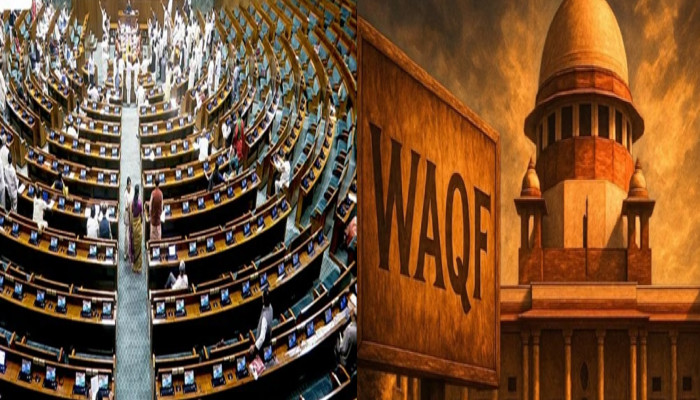Centre defends 'waqf by user' in Supreme Court against misleading claims
- In Reports
- 05:18 PM, Apr 25, 2025
- Myind Staff
The Centre defended the changes made to the waqf law on Friday, opposing any temporary halt to its provisions while the Supreme Court hears challenges based on religion and property issues. The Centre also argued that although the original 1923 Act required all waqfs, including 'waqf by user,' to be registered, many private and government lands were wrongfully claimed as 'waqf by user.' This led to the loss of valuable property rights for individuals and allowed unauthorised claims over public land.
"A deliberate, purposeful and intentionally misleading narrative is built very mischievously, giving the impression that those waqfs, including ‘waqf by user’, which do not have documents to support their claims, will be affected. This is not only untrue and false but purposefully and deliberately misleading court," said the Centre in its counter-affidavit.
In its response to petitions challenging the Waqf (Amendment) Act, the Centre clarified that "waqf by user" has been recognised only when registered for the last 100 years, and not simply based on verbal agreements. "Hence, the amendment aligns with consistent practice," the Centre told the bench. "Taking away the statutory protection to a waqf by user does not deprive a person of the Muslim community to create a waqf," stated the Centre.
The Centre clarified that the only requirement to be protected under the proviso is that the 'waqf by user' must be registered by 08.04.2025, as registration has always been mandatory. It also mentioned that those who did not register under 'waqf by user' cannot receive the benefits of the provision. "Waqf by user" refers to land or property that is considered waqf because it has been used for religious purposes over a long period of time. Even if there is no formal document or written deed, this property can be declared "waqf by user" based on how it has been used over time.
Earlier this month, the Supreme Court raised concerns about the removal of the "waqf by user" status, the inclusion of non-Muslims on waqf boards, and the role of the Collector in deciding whether land is waqf, especially when it comes to disputed government land. “We do not stay legislation normally at this stage of the challenge unless in exceptional circumstances. This appears to be an exception. Our concern is that if waqf-by-user is de-notified, there could be huge consequences,” Chief Justice of India Sanjiv Khanna observed while flagging certain provisions of the act.
On April 17, Solicitor General Tushar Mehta assured the court that, following the latest amendment, non-Muslim members would not be appointed to either the Central or State waqf boards. He also stated that ‘waqf by user’ would not be de-notified until the next hearing.
Accepting Mehta's assurances, the Supreme Court decided not to issue an interim stay and asked the Centre, states, and waqf boards to submit their responses within a week. Regarding the inclusion of two non-Muslims among the 22 members of the Waqf Council, the Centre explained on Friday that this decision was meant to promote inclusiveness and was not intended to interfere with the administration of waqf.







Comments